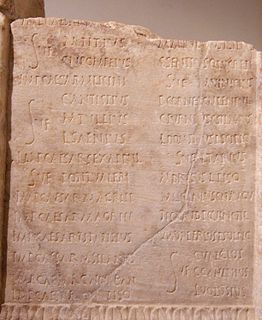Related Research Articles

This article concerns the period 49 BC – 40 BC.

The Second Triumvirate was a political alliance formed after the Roman dictator Julius Caesar's assassination, between Caesar's three most important supporters: Octavian, Mark Antony and Marcus Aemilius Lepidus. The triumvirate for organizing the republic, as it was formally known, ruled the Roman Republic essentially as a military dictatorship, with each of the triumvirs assuming charge of an individual set of provinces. Unlike the earlier First Triumvirate, the Second was an official, legally established institution, whose overwhelming power in the Roman state was given full legal sanction and whose imperium maius outranked that of all other magistrates, including the consuls.

The gens Aemilia, originally written Aimilia, was one of the greatest patrician families at ancient Rome. The gens was of great antiquity, and claimed descent from Numa Pompilius, the second King of Rome. Its members held the highest offices of the state, from the early decades of the Republic to imperial times. The Aemilii were almost certainly one of the gentes maiores, the most important of the patrician families. Their name was associated with two major roads, an administrative region of Italy, and the Basilica Aemilia at Rome.

The gens Junia was one of the most celebrated families of ancient Rome. The gens may originally have been patrician, and was already prominent in the last days of the Roman monarchy. Lucius Junius Brutus was the nephew of Lucius Tarquinius Superbus, the seventh and last King of Rome, and on the expulsion of Tarquin in 509 BC, he became one of the first consuls of the Roman Republic.
Marcus Aemilius Lepidus was a Roman statesman and general. After the death of Lucius Cornelius Sulla, he joined or instigated a rebellion against the government established by Lucius Cornelius Sulla, demanding a consecutive term as consul late in his year and – when refused – marching on Rome. Lepidus' forces were defeated in a battle near the Milvian Bridge and he fled to Sardinia. He was the father of the triumvir Marcus Aemilius Lepidus and of one of the consuls for 50 BC Lucius Aemilius Lepidus Paullus.
Quintus Pedius was a Roman who lived during the late Republic, and, early Empire. He was the son of a Marcus or Quintus Pedius, and a nephew or grandnephew of the dictator Julius Caesar, by one of his sisters.
Gaius Vibius Pansa Caetronianus was consul of the Roman Republic in 43 BC. Although supporting Gaius Julius Caesar during the Civil War, he pushed for the restoration of the Republic upon Caesar’s death. He died of injuries sustained at the Battle of Forum Gallorum.
Marcus Lollius perhaps with the cognomen Paulinus was a Roman politician, military officer and supporter of the first Roman emperor Augustus.
Manius Aemilius Lepidus was a Roman politician who became consul in 66 BC alongside Lucius Volcatius Tullus.
Marcus Cocceius Nerva was consul of the Roman Republic in 36 BC, together with Lucius Gellius Poplicola. His family were of Umbrian origin and were supporters of Marcus Antonius, providing him with a number of generals and diplomats.
Gaius Norbanus Flaccus was a Roman politician and general during the 1st century BC.
Mamercus Aemilius Lepidus Livianus was a Roman politician and military commander who was consul in 77 BC.
Hortensia, daughter of consul and advocate Quintus Hortensius Hortalus, earned renown during the late Roman Republic as a skilled orator. She is best known for giving a speech in front of the members of the Second Triumvirate in 42 BC that resulted in the partial repeal of a tax on wealthy Roman women.
Lucius Sempronius Atratinus was a Roman politician who was elected suffect consul in 34 BC. He is mentioned in Pro Caelio, a famous speech in defense of Marcus Caelius Rufus by Marcus Tullius Cicero.
Marcus Junius D. f. M. n. Silanus was a Roman senator and consul in 25 BC as the colleague of Gaius Julius Caesar Octavianus, the emperor Augustus.
Gaius Antistius Vetus was a Roman politician and general who was consul suffectus in 30 BC as the colleague of Augustus, succeeding Marcus Licinius Crassus.
Appius Claudius Pulcher was a Roman politician. An early supporter of Augustus, he was elected consul in 38 BC.
Decimus Junius Brutus was a Roman politician who was elected consul in 77 BC.
Gaius Fonteius Capito was a Roman senator who was appointed suffect consul in 33 BC.